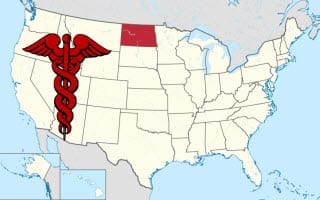The American Medical Association has released the results of a study on the health insurance marketplace in North Dakota, which has revealed that the environment in the state is nearly a monopoly.
The primary health insurance company in the state is Blue Cross Blue Shield. The study has made it clear that it is not claiming that any of the insurers are actually gouging the consumers. Previous research has indicated that the contributions being made by employees to their plans aligns well with the national average. Moreover, the plans in the state are typically considered to be favorable in terms of the benefits that they offer.
The study has pointed out a different health insurance issue in the state of North Dakota.
The dominance of Blue Cross Blue Shield is in the area of the market’s preferred provider segment. There, customers choose a specific medical system and then if they stray from that network in order to receive care, they will need to pay a larger amount out of pocket. Of that segment, the insurer holds 54 percent, said the study.
That health insurance company also holds 81 percent of the point of service marketplace. This is a segment that is made up of a fusion of the preferred provider area combined with the notably more limited health maintenance organization (HMO), which requires that a doctor authorize any forms of treatments that will be paid for by the coverage.
The health Insurance Department figures in the state have shown that Blue Cross Blue Shield’s market position in that area are even greater than those tallied by the study, saying that it takes in around 85 percent of the standard private sector.
According to the Insurance Commissioner, Adam Hamm, the research results have identified that there is essentially one major health insurance company in the state, and that things could improve in a different environment. Hamm explained that consumers are still receiving a larger number of choices. Within the last year, the insurers have offered residents six new major medical coverage plans.

